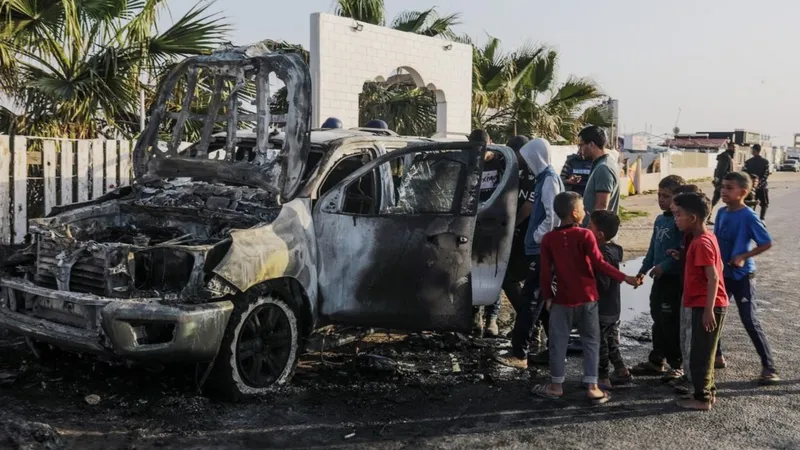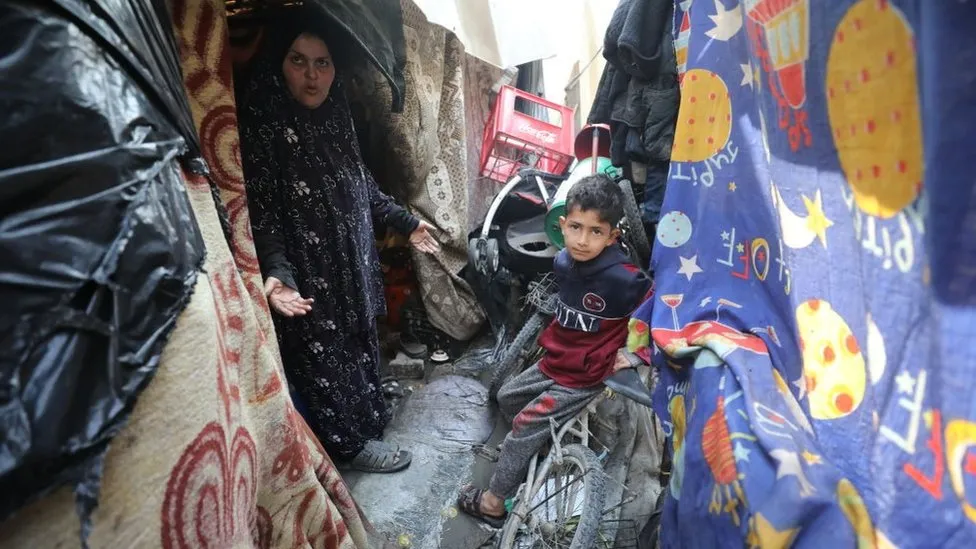Many Palestinians in the Gaza Strip will be wondering how they are going to feed their families after World Central Kitchen (WCK) paused its operations in response to the killing of seven of its aid workers in an Israeli air strike.
Another US charity it works with, Anera, has also suspended work because of the escalating risks faced by its local staff and their families. Together, they were serving two million meals a week across the Palestinian territory, where the UN has warned that an estimated 1.1 million people – half the population – are facing catastrophic hunger because of Israeli restrictions on aid deliveries, the ongoing hostilities and the breakdown of order.
WCK’s decision to pause its work also led to the “freezing” of a maritime aid corridor from Cyprus, which the charity helped set up last month to increase the trickle of aid getting into the north of Gaza and avert a looming famine.
The WCK convoy was hit on Monday night as it travelled south along the Israeli-designated coastal aid route, just after they had unloaded more than 100 tonnes of food from a barge at a warehouse in Deir al-Balah.

That barge was part of a four-vessel flotilla that sailed back to Cyprus with 240 tonnes of supplies that could not be brought ashore in the wake of the strike.The Norwegian Refugee Council warned that “what happened to World Central Kitchen threatens the entire aid system” and had left it “on the brink”.
WCK accused the Israeli military of a “targeted attack” on vehicles clearly marked with the charity’s logo and whose movements had been co-ordinated with Israeli authorities. The victims were British, Polish, Australian and Palestinian, and also included a dual US-Canadian citizen.
The military’s chief of staff, Lt Gen Herzi Halevi, described the strike as a “grave mistake” that had followed “misidentification at night”.
He also vowed to take “immediate action” to ensure that more was done to protect aid workers, including the immediate establishment of a new “humanitarian command centre” to improve co-ordination. “Israel is at war with Hamas, not with the people of Gaza,” he stressed.
However, aid groups say they are not sure such promises will lead to meaningful changes. They also assert that this was not an isolated incident, with 196 Palestinian aid workers reportedly killed since the war began in October.
Jan Egeland, the secretary-general of the Norwegian Refugee Council and a former UN humanitarian chief, told the BBC that WCK was “among those who have the closest co-operation with the Israelis”, in terms of sharing information about their workers’ locations and planned movements.
Before the strike, WCK was playing an increasingly prominent and important role in Gaza, with 400 Palestinian staff and 3,000 people working indirectly for it in its 68 community kitchens and distribution system.
WCK has provided 12% of the 193,000 tonnes of aid from international organisations that had reached Gaza since October, according to data from Cogat, the Israeli defence ministry body tasked with co-ordinating deliveries. However, UN agencies were responsible for 80% of the total.
WCK’s founder, the chef José Andrés, told Reuters news agency on Wednesday that it was “analysing the situation and how to keep doing the work we do”.
Anera – which was providing 150,000 meals a day in collaboration with WCK – said it understood the consequences pausing its own work would have on Palestinians, but that its Palestinian staff had for the first time deemed the risk to their safety and that of their families “intolerable”.
It said the charity’s logistics co-ordinator and his son had been killed in an Israeli air strike in Deir al-Balah in March, despite the fact that the co-ordinates of the shelter where they were staying had been provided to the Israeli military.
“We’ve asked for explanation as to why that site was struck and we’ve received none,” Derek Madsen of Anera told the BBC. “These sites are known and so I think it is very difficult for us to understand how these strikes happen.”
Project Hope, another US-based organisation, paused its work for three days in solidarity with WCK and to “reassess the security situation as we prioritise our staff members’ safety”.
Arlan Fuller, director of emergency preparedness and response, said in a statement sent to the BBC that its employees were deeply concerned by the deaths of the WCK team, and that the strike has raised significant doubts about the effectiveness of co-ordination with the Israeli military.
For the people of Gaza, the suspension of WCK’s operations “means more famine, more dead children, more epidemic disease because people are so malnourished”, Mr Egeland warned.
At least 27 children are reported to have died as a result of malnutrition since October, according to the World Health Organization.
Mr Egeland urged Israel to start by opening the Karni and Erez border crossings with northern Gaza to allow aid convoys to drive there directly.
Most aid convoys are currently forced to start at the Israeli-controlled Kerem Shalom and Egyptian-controlled Rafah crossings with the south of Gaza and then pass through what the UN calls “high-risk areas”, mainly due to shooting and shelling or the breakdown in civil order.

Cogat says Israeli forces have co-ordinated the entry of more than 500 lorries into the north over the past two months via those routes as well as a new gate and military road that runs south of Gaza City.
Israel has also facilitated the now-suspended maritime corridor set up by WCK as well as airdrops of aid by Western and Arab countries. The UN says both are helpful but cannot replace the large-scale delivery of aid by land.
The first WCK aid ship was carrying 200 tonnes of aid and took several days to reach Gaza. By comparison, a lorry can carry about 20 tonnes and the nearest Israeli container port is only a 40km drive from northern Gaza.
A C-130 transport plane meanwhile has a maximum payload of 21 tonnes, but only about 40 airdrops have taken place so far and they are considered expensive, ineffective and dangerous for people on the ground.
The UN says 159 lorry loads of aid crossed into Gaza by land each day on average between 1 and 28 March, and that the pre-war average was 500 lorry loads, including fuel.
Cogat says the pre-war average only included 70 food lorries and that 140 entered each day during March. It insists there is no limit to the amount of food and other humanitarian aid that can enter Gaza and accuses UN agencies of failing to distribute aid effectively.
There was no apparent drop-off in aid crossing into Gaza following the strike on the WCK convoy, with 217 lorries transferred via Israel and Egypt on Wednesday and 179 food packages being airdropped, according to Cogat.
But Nate Mook, who was chief executive of WCK until 2022, warned that the longer-term consequences could be “devastating” for Gazans because “we probably have not seen the last of the aid organisations to pull out”.
Zawar Ali of International Medical Corps told the BBC that it was reconsidering its safety protocols and whether to restrict its workers’ movements.
It had already decided to relocate its field hospital from the north of Rafah to al-Mawasi, an area to the west which the Israeli military has declared “humanitarian zone” but has still carried out strikes on what it says are Hamas targets.
Dr Bashar Murad, the executive director of the Palestinian Red Crescent, said many of its paramedics were refusing to evacuate wounded and sick people from the north to the south in their ambulances due to the lack of safety guarantees, despite their protection under international law and co-ordination efforts by international organisations.
Aseel Baidoun of Medical Aid for Palestinians said it had not suspended operations after a strike in January damaged a residential compound in al-Mawasi that housed the British charity’s local team and their families, injuring several people. But now, she added: “We really are scared of the security [situation].”
“If a foreigner with international immunity is bombed and killed, then what will they do to us?” Mohammed Aborjela, a Palestinian online content creator who launched the Youth of Gaza initiative to deliver aid after the war began, told BBC.
He said Palestinian aid workers faced higher risks and greater challenges than their international colleagues, but insisted it would not stop him and his colleagues continuing their work. “The danger of not providing aid is no less important than the danger of being killed,” he added.Natalia Anguera of Action Against Hunger also said it would try to continue working despite “more and more challenging” conditions.
“Most of our staff are… Palestinians. They are suffering themselves, but they also have a very strong and clear commitment to their humanitarian mandate. They want to go on delivering,” she told the BBC.
She said the international community needed to push strongly for a humanitarian ceasefire because it was the only way that aid organisations would be able to scale up their response to the level required.
Mr Egeland also stressed the importance of the UN agency for Palestinian refugees (UNRWA), which he said was “bigger than the rest of us combined” but was being “systematically undermined by Israel”.
Israel accuses UNRWA of supporting Hamas, which triggered the war when its gunmen attacked southern Israel on 7 October last year. The agency has denied this, but in January it sacked nine of the 12 employees accused in an Israeli document of playing a part in the attacks.
UNRWA called for a “complete reversal in policies” from Israel in response to Monday’s strike, including lifting the ban on it delivering aid to northern Gaza.





































